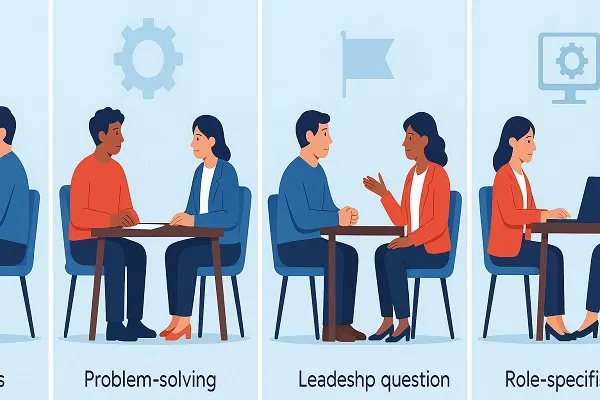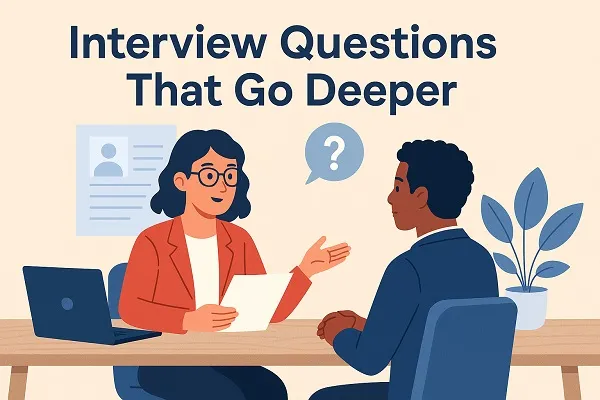Why Deeper Interview Questions Matter
Interview questions that go deeper help hiring managers move beyond surface-level responses and uncover a candidate’s true potential. Instead of focusing only on qualifications and technical expertise, these thought-provoking questions reveal motivation, problem-solving skills, and cultural alignment. By digging deeper, you get insights that a resume or standard interview simply cannot provide.
Employers who master deeper interview questions are better equipped to select candidates who not only have the skills but also the mindset to thrive in dynamic workplaces.
Moving Past Traditional Interview Questions
Standard questions like “What are your strengths and weaknesses?” often lead to rehearsed answers. While they still serve a purpose, relying solely on them may limit your understanding of how a candidate thinks.
The Pitfalls of Surface-Level Questions
- Predictable answers that don’t showcase individuality
- Candidates focus on what they think you want to hear
- Missed opportunities to uncover soft skills such as adaptability, leadership, or emotional intelligence
Why Employers Benefit From Going Deeper
- Gain authentic insights into a candidate’s values
- Understand problem-solving approaches in real-world scenarios
- Spot potential red flags before extending an offer
Categories of Interview Questions That Go Deeper

Behavioral Questions With Layers
Behavioral interviewing is already popular, but layered follow-up questions make it even more powerful. Instead of asking, “Tell me about a time you overcame a challenge,” go further with:
- “What steps did you take to evaluate your options?”
- “How did you measure success in that situation?”
- “Looking back, what would you have done differently?”
These layered questions encourage candidates to reflect and reveal self-awareness.
Situational & Hypothetical Scenarios
Placing candidates in hypothetical scenarios shows how they think under pressure.
Example prompts:
- “If your project deadline was suddenly moved up by two weeks, how would you adjust?”
- “How would you handle receiving conflicting feedback from two managers?”
Such questions highlight adaptability, creativity, and resilience.
Value-Driven Questions
Asking about personal values reveals cultural alignment. Questions might include:
- “What kind of company culture allows you to do your best work?”
- “How do you define success beyond metrics and results?”
- “What motivates you to stay engaged during tough projects?”
Candidates’ answers reveal whether their values align with organizational goals.
Crafting Your Own Deep Interview Questions
Tailor Questions to Your Company’s Needs
Instead of relying on generic interview guides, craft questions that mirror real challenges your team faces. For example, if collaboration is key, ask:
- “Tell me about a time when your input completely changed the direction of a project. How did you communicate that?”
Use Follow-Ups Strategically
Don’t stop after the first answer. Following up with “Why?” or “Can you give me another example?” often uncovers layers that reveal thought processes and character.
Balance Hard and Soft Skill Exploration
Deeper interview questions shouldn’t focus only on technical knowledge. Balancing technical and interpersonal insights ensures a holistic evaluation.
Examples of Interview Questions That Go Deeper

Self-Awareness and Personal Growth
- “What’s a recent habit you developed that has improved your performance at work?”
- “If I asked your former colleagues what your biggest blind spot was, what would they say?”
- “What’s one skill you’re currently working on, and why did you choose that one?”
- “When was the last time you were outside of your comfort zone professionally, and how did you handle it?”
Leadership and Influence
- “Tell me about a time you had to gain buy-in from someone who initially disagreed with you.”
- “How do you mentor or support team members who are struggling?”
- “What does leadership mean to you when you’re not in a management role?”
- “Describe a situation where you helped elevate someone else’s idea rather than your own.”
Collaboration and Teamwork
- “What role do you typically play on a team, and how has that shifted over time?”
- “Share an example of when you had to work with someone whose style clashed with yours. How did you adapt?”
- “What’s the most important element of building trust with teammates?”
- “How do you handle disagreements in a way that keeps the project moving forward?”
Problem-Solving and Innovation
- “What’s the toughest professional challenge you’ve faced, and what creative solutions did you explore?”
- “If resources were unlimited, what change would you make to improve your last workplace?”
- “Describe a time you solved a problem no one else could figure out. What was your approach?”
- “What’s the boldest decision you’ve ever made at work?”
Adaptability and Resilience
- “How do you stay motivated when priorities keep shifting?”
- “Tell me about a time when you faced unexpected failure. What did you learn?”
- “When everything feels urgent, how do you prioritize?”
- “Describe a time when you had to let go of a project or idea you cared about. How did you handle it?”
Emotional Intelligence and Communication
- “What’s a piece of feedback you initially disagreed with but later realized was accurate?”
- “How do you handle moments when emotions run high at work — either yours or someone else’s?”
- “Tell me about a time you had to deliver difficult news. How did you prepare?”
- “How do you make sure people feel heard in meetings?”
Motivation and Values
- “What kind of work gives you the most energy, and why?”
- “What principles guide your decision-making when you’re under pressure?”
- “If you could design your ideal role, what would it include and why?”
- “What makes you stay with a company long-term?”
Role-Specific Deep Interview Questions
🔹 For Managers & Leaders
- “Tell me about a time you had to make an unpopular decision. How did you handle the pushback?”
- “How do you balance hitting business goals with supporting employee well-being?”
- “Describe a situation where you had to coach someone who wasn’t aware of their own performance issues.”
- “What’s an example of a time you had to lead a team through uncertainty or change?”
🔹 Sales Professionals
- “What’s the toughest sale you ever lost, and what did you learn from it?”
- “How do you build trust with a client who is skeptical from the start?”
- “Tell me about a deal that required you to pivot your approach midway. How did you recognize the need to adjust?”
- “When a quota feels out of reach, how do you stay motivated and keep your pipeline moving?”
🔹 For Customer Service Roles
- “Share a story about a time when you turned an angry customer into a loyal advocate.”
- “How do you balance empathy with efficiency when dealing with high call or ticket volumes?”
- “What’s the hardest customer interaction you’ve had, and what would you do differently now?”
- “How do you handle situations where you don’t know the answer right away?”
🔹 Software Engineers / Developers
- “Tell me about a time you had to refactor code or simplify a system that became too complex. What was your process?”
- “What’s an example of when you pushed back on a technical decision, and why?”
- “How do you approach learning a completely new technology under tight deadlines?”
- “What’s the biggest mistake you’ve made in code, and how did you fix it?”
🔹 For Project Managers
- “Describe a time when your project scope changed unexpectedly. How did you communicate the impact?”
- “What’s the most difficult stakeholder relationship you’ve managed, and how did you make it work?”
- “How do you prioritize when deadlines, budgets, and resources are all competing?”
- “Share an example of when you delivered a project that didn’t meet expectations. What did you learn?”
🔹 Marketing Professionals
- “Tell me about a campaign you thought would succeed but didn’t. What happened?”
- “How do you measure creativity alongside ROI in your work?”
- “What’s an example of when you had to reposition messaging after unexpected market feedback?”
- “How do you balance brand consistency with experimenting on new channels?”
🔹 For HR / People Operations
- “What’s an example of when you helped resolve a conflict that leadership was reluctant to address?”
- “How do you ensure fairness in hiring while under pressure to fill roles quickly?”
- “Tell me about a time you had to influence company culture without a formal mandate.”
- “What strategies have you used to build trust with both employees and executives?”
🔹 Finance & Accounting
- “Describe a time you found an error or risk others overlooked. How did you address it?”
- “How do you balance cost-cutting with maintaining long-term growth opportunities?”
- “What’s the most difficult financial recommendation you’ve made, and how did you present it?”
- “Tell me about a time you had to explain a complex financial concept to a non-finance audience.”
Common Mistakes to Avoid With Deeper Interview Questions

While these questions are powerful, they can be misused.
- Asking too many deep questions in a row: This may overwhelm candidates.
- Not listening actively: If you’re too focused on the next question, you may miss valuable insights.
- Failing to set context: Candidates should understand why you’re asking deeper questions to avoid unnecessary discomfort.
- Overcomplicating phrasing: Keep your questions clear and straightforward.
How Candidates Benefit From Deeper Questions
It’s not just employers who gain value. Candidates also appreciate thoughtful questions because they:
- Provide an opportunity to showcase experiences that matter
- Create a more authentic connection with interviewers
- Allow candidates to determine if the company aligns with their own values
This two-way exchange makes interviews more meaningful and sets the tone for a strong working relationship.
Interview questions that go deeper elevate the hiring process by going beyond rehearsed answers and uncovering genuine insights. When done well, these questions highlight a candidate’s self-awareness, emotional intelligence, and ability to thrive in complex environments.
By striking a balance between behavioral, situational, and value-driven questions, employers can ensure they’re making informed hiring decisions—ones that lead to long-term success for both the individual and the organization.
Content reviewed and published by Tier2Tek Staffing Editorial Team .

